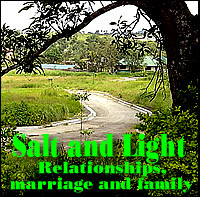We don’t have a divorce law here in the Philippines. But we do have its equivalents (for example, declaration of nullity of a marriage based on Article 36 of the Family Code) which allow the estranged couple to marry other persons after their marriage has been declared null and void. Please take note that on the basis of Article 15 of the New Civil Code, a divorce obtained by a Filipino abroad will not be recognized here in the Philippines. Please read the following articles I have written on the issue of divorce and remarriage for Filipinos:
The issue I wish to discuss here however is the Biblical grounds for divorce and remarriage. I’m sure you have heard the expression “What is legal is not always moral, and what is moral is not always legal.” Well, let me rephrase it this way, “What is legal is not always Biblical, and what is Biblical is not always legal.”
Divorce obtained abroad by Filipino citizen against alien spouse now recognized in the Philippines
Filipino divorced by spouse (who's formerly a Philippine citizen) can remarry under Article 26 of the Family Code
Ruffa, Ylmaz, TV Patrol, divorce and remarriage by Filipinos; John and Gretchen?
Over the years, pastors and church members have asked me for advice on what to do in situations where a new believer in Christ is legally married but is now separated and living in with another partner. While I could outline the laws and legal procedures in annulling a marriage, I would always tell the church member to consult his pastor on whether he has Biblical grounds for annulling his marriage.
My discussion here is based primarily on three sources: (1) Chuck Swindoll’s book “Strike The Original Match”; (2) Kerby Anderson’s article on divorce from the Probe Ministries website; and (3) from the Radio Bible Class Ministries article “Divorce and Remarriage” by RBC research editor Herb Vander Lugt.
Swindoll’s views on divorce and remarriage
Chuck Swindoll describes it accurately when he said in his book (published by Multnomah Press, 1980) that a busload of evangelical theologians will never achieve unanimity in their views of divorce and remarriage even if the bus went on a tour for the whole summer. Some Filipino pastors will categorically state, “The Bible does not allow divorce under any circumstance, period. The Bible does not allow remarriage, either, period.”
My own views are similar to those propounded by Swindoll. He states that based on Matthew 19 and I Corinthians 7:12-15, there are three circumstances or grounds for a valid, Biblical divorce and remarriage. These are:
1. When the marriage and divorce occurred prior to salvation;Swindoll closes his discussion by quoting John R.W. Stott (Church Counter-Culture, IVF Press 1978) who says, “Divorce was a divine concession to human weakness.” Swindoll adds, “No Christian should aggressively seek the dissolution of his or her marriage bond. Some of the very best things God has to teach His children are learned while working through marital difficulties. Endless stories could be told of how God honored the perseverance of abused and ignored parties as they refused to give up.”
2. When one’s mate is guilty of sexual immorality and is unwilling to repent and live faithfully with the marriage partner;
3. When one of the mates is an unbeliever and willfully and permanently deserts the believing partner.
Dr. Ed Wheat, M.D. in his book “Love Life for Every Married Couple” (reprinted in the Philippines by Christian Literature Crusade) echoes the same view in page 227: “Do not give your husband a divorce. Do all in your power to delay or prevent it. If you must consult a lawyer, make it clear to the lawyer that it is only for your financial protection and that of your children. Find a Christian lawyer who will help you preserve your marriage.”
Anderson’s views
Kerby Anderson agrees with Swindoll that divorce and remarriage are Biblical only “in cases of marital infidelity by the other spouse or in cases of desertion by an unbelieving spouse.” Anderson also warns that even in these cases, pastors and churches should encourage reconciliation, not divorce.
Anderson also briefly tackles the issue of domestic violence or spousal abuse. He says that “in very troubling cases which involve mental, sexual and/or physical abuse, legal separation is available as a remedy to protect the abused spouse.”
Vander Lugt’s views; spousal abuse as a ground for divorce and remarriage
The Radio Bible Class Ministries article by Vander Lugt discusses in greater detail the issue of domestic violence or spousal abuse as a ground for divorce. Vander Lugt basically agrees with Swindoll and Anderson that the Bible permits divorce and remarriage on two grounds: sexual infidelity and the desertion of a spouse by an unbeliever.
However, Vander Lugt argues that I Corinthians 7:10-11 is the Apostle Paul’s compassionate provision for an abused woman. He states, “ … a woman who is married to a physically abusive husband may not be sinning when, with the encouragement of her spiritual counselors, she seeks divorce action – even if her husband is not guilty of sexual immorality.” He adds however that in such a case, remarriage is not allowed.
It is clear from the previous citation of Swindoll, Anderson and Wheat’s views, that Vander Lugt departs completely from what is certainly the majority view on divorce and remarriage.
A lot of pastors will also find questionable Vander Lugt's views that:
1. “When two people whose divorces were not valid in God’s sight come together in the sexual union of marriage, they break their former marriage covenant. But this is not a continuing state. From this point on, they are husband and wife.
“God considers two people as married when they have met the civil requirements. This is true even when their divorces were not valid in God’s sight.”
2. “ … when two people marry after a divorce on grounds less than specified by Jesus and Paul, they sin against the covenant they made in the previous marriage. But this occurs only once. Their first sexual union breaks the former bind. The new marriage covenant is now in effect.”
Ptr. John MacArthur Jr. (I can’t remember the exact source) on the contrary, says that since the divorce is not Biblical, God doesn’t recognize the subsequent marriage. Most Filipino pastors I know would also take strong exceptions to these views by Vander Lugt. To be fair however, Vander Lugt doesn't simply pull these views out of thin air. He bases his views on the difference between the Greek word for fornication ("porneia") and for adultery ("moicheia"). You can read his complete article at the Radio Bible Class Ministries website.
I began this discussion with the statement, “What is legal is not always Biblical, and what is Biblical is not always legal.” Let me pose a situationer for you at this point.
The Family Code of the Philippines provides in Articles 41 up to 44 what is known as “declaration of presumptive death for purposes of remarriage.” If a spouse has been missing for two years (extraordinary absence) or four years (ordinary absence), and there is well founded belief that the absent spouse is dead, the present spouse can file a petition in court asking that the absent spouse be declared presumptively dead. After the court’s decision has become final and executory, the present spouse is now free to remarry.
That’s the law. My question to you is this: You’re a pastor, and your church member says that he or she wants to avail of Articles 41 to 44 of the Family Code in order to marry someone. Would you say that the member has a Biblical reason for remarriage?







